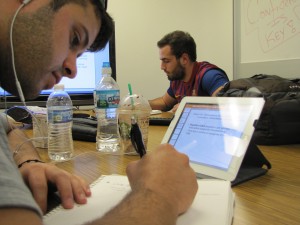Tradition vs. technology

With the advent of e-books, the idea of a physical textbook may seem silly. With just one click, students can download a five pound textbook to their laptops, which they would be carrying around anyway. This also gives students an excuse to have their laptop open during class.
To some students at Oakland University, however, this is not the case.
Although Alicia Bianchette, a senior social work student, admitted that e-books are sometimes cheaper and that she enjoys being able to look up unknown words at the click of her mouse, she also said that she would rather have the physical textbook.
“I can highlight in textbooks and sell them back if I need the money,” she said. “But book sales have to be going down.”
Beth Dennis, a junior social work student, also prefers physical books to the e-reader versions. She said she prefers to physically verify how far along in a book she is and sometimes e-books can be difficult to loan to people with different software.
Even though she has a laptop, Dennis also said she prints off every article needed for class instead of just reading it on her computer, like many of her classmates.
According to Katie DeSandre, sales associate at the OU bookstore, sometimes professors’ policies can prevent students from buying the e-version of their textbooks as well.
“Some of the professors don’t allow computers in class, so (students) figure, ‘why waste the money,’ when they can’t even use it during the class time,” Katie DeSandre said.
The issue of compatibility across multiple platforms and different types of software can also prevent students from buying e-books, Anna Lankin, a sales associate at OU’s bookstore, said.
“The e-books aren’t compatible with the iPads, Nooks or Kindles yet, so because they’d rather take their iPad than their computer to class, and it’s not compatible, they’d rather buy the book,” she said.
The Barnes & Noble website states that e-books are not available on Nooks because “textbooks do not display well on small screen.”
The website further elaborates on the company’s reasoning behind why only computers support Nook software.
“In support of the research we conducted and with sensitivity to the economic realities most students face, we chose to build the first generation of Nook Study to work on PC and Mac computers, devices students most commonly use for studying. (The website) will continue to innovate Nook Study, expanding its capabilities and usages to meet students’ diverse needs and wants — stay tuned.”
In addition to the limitations of e-books, Lankin believes the benefits of renting books often appeal students as well. Renting books is cheaper than buying the physical or e-version of textbooks.
Contact senior reporter Sarah Hunton via email at [email protected]







